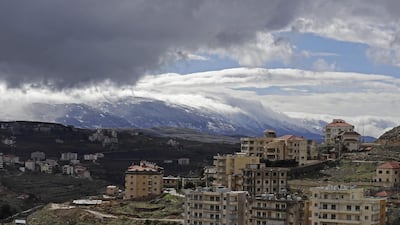Earlier this month the Lebanese government announced it had, for a reported $1.5 million fee, retained the services of McKinsey & Co, the global management-consulting firm, to submit a report that should propose Lebanon’s ideal economic model, one that will hopefully show how the country can maximise its aching but hitherto unfulfilled potential.
One could argue that the move cannot come soon enough. On Tuesday Prime Minster Saad Al Hariri told his ministers to cut their 2018 budgets by 20 per cent, presumably to cut costs. Ironically jobs and salaries remain intact at a time when even the most naive Lebanon observer can attest to the fact that the public sector is bloated with deadwood employees.
But back to the report: surely we'd been here before. Had not successive governments commissioned similar reports by the likes of Booz Allen Hamilton, Deloitte, PwC and EY? Didn't we already know what was holding us back? My cynicism was compounded by the fact that the report was commissioned by the minister of economy Raed Khoury who, while an accomplished financier in private life, is also a member of the Free Patriotic Movement (FPM) of the President Michel Aoun.
The FPM would like us to believe that they are different than the rest of Lebanon's political parties, most of which are defined by an element of thuggery and are bereft of any real national vision. FPM members style themselves as technocrats who want to change the face of party politics by swapping the grenade launcher for the spread sheet and the party can claim a significant tranche of the Christian professional middle class in its support base.
But there is as always an elephant in the Lebanese room. The FPM's biggest ally, indeed the party that in all probability helped propel Mr Aoun to presidency, is Hezbollah, the Iranian backed party whose well-armed militia needs no introduction, but whose "extra-state" activities are one of the main reasons Lebanon's economy has been in the deep freeze in the first place.
And then we have the timing. There is a good chance that parliamentary elections will be held in May. If so, it will mean a new government and Mr Khoury may well be out of a job. The report will gather dust and good money will have been wasted. Many in Lebanon are claiming that this is just an expensive Aounist stunt to burnish the party’s technocrat credentials.
But the main dollop of scepticism is, and always will be, reserved for the fact that the implementation of any future recommendations is the real challenge. We all know that Lebanon’s economy is in need of serious diversification. We know that most revenue streams are restricted to banking, remittances, real estate and tourism. We know human capital is in flight. We know it took 12 years to pass the most recent budget; that debt to GDP ratio is over 150 per cent; that unemployment is running at 25 per cent (rising to 35 per cent among the youth) and that the balance of trade deficit is over $11 billion.
And while Mr Khoury no doubt has a genuine desire to improve all these areas, the fact remains that Hezbollah's robust martial posture in Lebanondoes nothing to encourage foreign investment. Meanwhile, the banking industry has been historically stubborn amid calls to spur the much-needed diversification, both within its ranks and the wider economy, to create a sound economic model.
___________
Read more:
Lebanese crave economic liberation beyond Iran's influence
Lebanon needs to offer more in return for foreign investments
___________
Moreover, Hezbollah’s grip on the country is so tight that it seems almost inconceivable that the state in its current form has either the ability or the will to dismantle the party’s state-within-a-state, which has created parallel economies that bypass the national coffers. Add to this the endemic cronyism and corruption that has blighted Lebanese public life for almost as long as the country has been around and which hinders the state’s ability to increase revenue through privatisation, and you will see the scale of the task at hand.
But there may be method to this particular madness. Of all the bodies that have written reports on making Lebanon more efficient, McKinsey is the most credible. It also can't harm Lebanon to have a reliable document written by an external and impartial team of experts that just might resonate with a Lebanese electorate trying to eke out a living in a glacial economy. And it will certainly help when Lebanon goes knocking on the doors of donor nations.
It is also equally likely that the document will have been requested, or imposed, by a supranational organisation like the World Bank, IMF or the European Bank for Reconstruction and Development (EBRD), which is due to start investing in Lebanon after the bank’s governors approved Lebanon’s application to become a country of operations in September 2017. The damning implication is that these bodies don’t entirely trust in-country data, and certainly if the EBRD wants to disburse its resources and expertise to help boost the economy and create jobs, it will have to rely on plausible statistics before releasing its funds.
Will the report, due in the summer, be the blueprint for an economic road map to prosperity for a nation that has been crying out for one for nearly 20 years?
Unlikely. The Lebanese economic model will probably still be short-termist and restricted to a few lucrative revenue streams, but if its publication at the very least starts a national debate (an entirely plausible scenario) on what needs to be done then it may just have been money well spent. Let’s see.
Michael Karam is a freelance writer who lives between Beirut and Brighton

